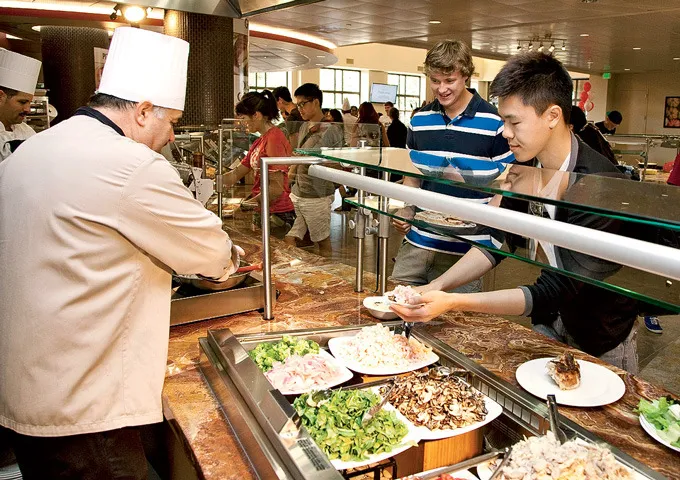Table of Contents
Stanford students — especially graduate students — are struggling with mental health issues yet lack basic necessities. Last quarter our community lost two students to suicide. If that isn’t a wake up call, I don’t know what is. According to the Graduate Student Council and the Diversity & Advocacy Committee’s 2017 Graduate Student Life Survey, 83 percent of students consider finances an anxiety-inducing hardship. In stringently zoned and rent-controlled Silicon Valley, housing accounts for a disproportionately large amount of this financial burden. However, as the council rallies for more graduate housing, it ought to address another solvable issue: food. How can we expect students to thrive emotionally and academically when they do not know where their next meal is coming from?
Largely thanks to stifling immigration laws that limit their employment options, international graduate students without family money often struggle to make ends meet. Not only must students studying on an F-1 visa meet extraneous requirements like maintaining a residence abroad, they are also prohibited from working off-campus during their first year of study. So even brewing coffee as a barista at Philz is out. As for employment opportunities after a student’s first year, a job must be in a student’s field of study, unless the employment is provided directly by the University. For jobs which they are allowed to work, students must first seek permission from an unfamiliar and confusing bureaucracy: U.S. Citizenship and Immigration Services. Worse, if an international student works a full assistantship of either research or teaching for 20 hours or more a week, they are not allowed to work additional hours for pay during the academic year. Although regulations allow for additional work in cases of extreme economic hardship, waivers are rare and generally take around three months to process.
These laws impact a significant number of the 9,500 students that comprise the graduate student body, 34 percent of whom are international. A recent piece in The Stanford Daily by Charlie Curnin focuses on just three students struggling with food insecurity. Undoubtedly many others face similar issues. From climbing trees and scavenging for food to relying on seminars with complimentary food to living “off cabbage and tortillas,” students have serious concerns yet little University support.
With Stanford’s twenty-four billion dollar endowment, there must be a solution. After examining the options at other schools, one stood out as particularly intriguing and viable — meal sharing initiatives. In December 2017, MIT launched SwipeShare, a program that allows students to donate their guest swipes to others struggling with food insecurity. As MIT reported in a news article, “there is no application or qualification process, and all requests [are] handled discreetly.” Within the first week, SwipeShare boasted 673 donated meals. Meals can be donated online through a student portal (similar to our current dining webportal), and both graduate and undergraduate students alike can contact their resident deans to request swipes. The program is open to all regardless of financial aid status and does not require lengthy forms. Thus, by keeping the barriers to entry low for all parties, a large following of students have elected to partake.
Programs similar to the food-sharing portal at MIT exist on campuses across the country. Tufts, Ohio State, NYU, and Northeastern all maintain comparable programs. Some even go as far as allowing students to share all unused swipes, rather than simply guest swipes and allow swipes to be requested online without dean approval.
So why doesn’t Stanford take similar initiative to promote student wellbeing?
Eric Montell, Executive Director of R&DE Stanford Dining, wrote to me over email that the University cannot afford to start a program like this as they must be “fiscally responsible to maintain the integrity of the dining hall meal program.” However, a swipe-sharing program should not cause a fiscal deficit. As a student, I have paid for all my meals. In fact, I have paid $16.18* per meal this year according to my “Cardinal Light” plan. This is more than it would cost me to eat out. So, why can’t I decide to share what I paid for instead of letting excess meals go unused and wasted?
Stanford is behind, prioritizing things like dorm trips to Disneyland over basic needs. Even though changing immigration law would be a more comprehensive solution to graduate students struggling with food security, the school can’t wait for an infamously unproductive Congress to address this fundamental issue. At a bare minimum, the University should not prevent students from helping each other. Stanford is neglecting to address the needs of students. As students, we must call upon Stanford to do better. I, for one, call upon not only University administration, but also the new ASSU Executives — Erica Scott and Isaiah Drummond — and the Senate to address these issues. We must stand together to protect each other. No one at one of the top universities in the world should go hungry.
If you have any interest in this project or know students who have faced food insecurity and are willing to share their experiences with University administration, please contact me at achepohl@stanford.edu.
*This number was calculated by including Thanksgiving Break, Spring Break, and guest swipes into total number of meal swipes.









